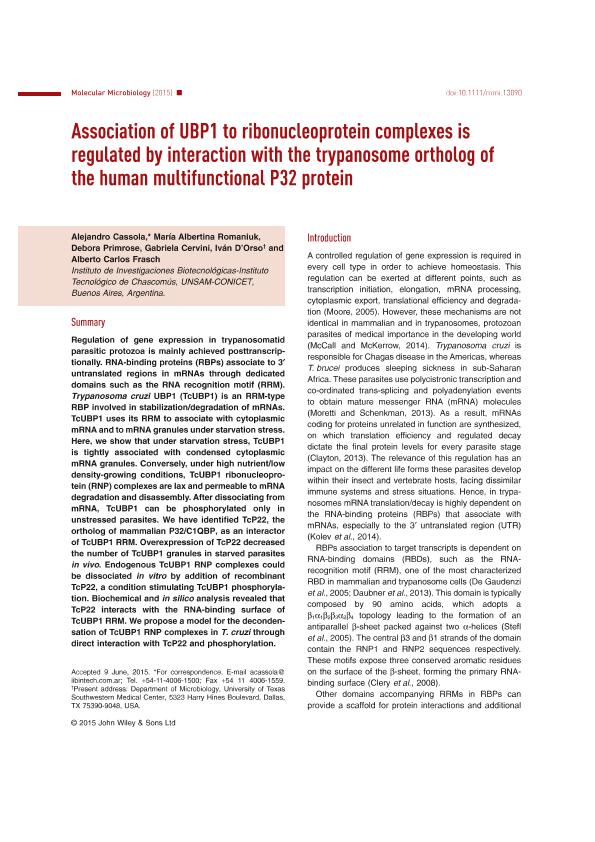Artículo
Association of UBP1 to ribonucleoprotein complexes is regulated by interaction with the trypanosome ortholog of the human multifunctional P32 protein
Cassola, Alejandro Carlos ; Romaniuk, María Albertina
; Romaniuk, María Albertina ; Primrose, Debora; Cervini Bohm, Gabriela Marta
; Primrose, Debora; Cervini Bohm, Gabriela Marta  ; D'Orso, Iván; Frasch, Alberto Carlos C.
; D'Orso, Iván; Frasch, Alberto Carlos C.
 ; Romaniuk, María Albertina
; Romaniuk, María Albertina ; Primrose, Debora; Cervini Bohm, Gabriela Marta
; Primrose, Debora; Cervini Bohm, Gabriela Marta  ; D'Orso, Iván; Frasch, Alberto Carlos C.
; D'Orso, Iván; Frasch, Alberto Carlos C.
Fecha de publicación:
09/2015
Editorial:
Wiley Blackwell Publishing, Inc
Revista:
Molecular Microbiology
ISSN:
0950-382X
Idioma:
Inglés
Tipo de recurso:
Artículo publicado
Clasificación temática:
Resumen
Regulation of gene expression in trypanosomatid parasitic protozoa is mainly achieved posttranscriptionally. RNA-binding proteins (RBPs) associate to 3′ untranslated regions in mRNAs through dedicated domains such as the RNA recognition motif (RRM). Trypanosoma cruziUBP1 (TcUBP1) is an RRM-type RBP involved in stabilization/degradation of mRNAs. TcUBP1 uses its RRM to associate with cytoplasmic mRNA and to mRNA granules under starvation stress. Here, we show that under starvation stress, TcUBP1 is tightly associated with condensed cytoplasmic mRNA granules. Conversely, under high nutrient/low density-growing conditions, TcUBP1 ribonucleoprotein (RNP) complexes are lax and permeable to mRNA degradation and disassembly. After dissociating from mRNA, TcUBP1 can be phosphorylated only in unstressed parasites. We have identified TcP22, the ortholog of mammalian P32/C1QBP, as an interactor of TcUBP1 RRM. Overexpression of TcP22 decreased the number of TcUBP1 granules in starved parasites in vivo. Endogenous TcUBP1 RNP complexes could be dissociated in vitro by addition of recombinant TcP22, a condition stimulating TcUBP1 phosphorylation. Biochemical and in silico analysis revealed that TcP22 interacts with the RNA-binding surface of TcUBP1 RRM. We propose a model for the decondensation of TcUBP1 RNP complexes in T.cruzi through direct interaction with TcP22 and phosphorylation.
Palabras clave:
Trypanosoma
,
Rna-Binding Protein
,
Ribonucleoprotein Comoplex
,
Rna Granules
Archivos asociados
Licencia
Identificadores
Colecciones
Articulos(IIB-INTECH)
Articulos de INST.DE INVEST.BIOTECNOLOGICAS - INSTITUTO TECNOLOGICO CHASCOMUS
Articulos de INST.DE INVEST.BIOTECNOLOGICAS - INSTITUTO TECNOLOGICO CHASCOMUS
Citación
Cassola, Alejandro Carlos; Romaniuk, María Albertina; Primrose, Debora; Cervini Bohm, Gabriela Marta ; D'Orso, Iván; et al.; Association of UBP1 to ribonucleoprotein complexes is regulated by interaction with the trypanosome ortholog of the human multifunctional P32 protein; Wiley Blackwell Publishing, Inc; Molecular Microbiology; 97; 6; 9-2015; 1079-1096
Compartir
Altmétricas



